Catholics
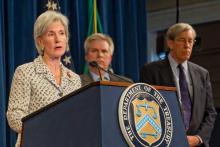
Tensions between the Archdiocese of Washington and Georgetown University are escalating ahead of an address on Friday (May 18) by Health and Human Services Secretary Kathleen Sebelius, a conflict that is becoming a microcosm of the political battles raging inside the Catholic Church.
Sebelius, a Catholic whose support for abortion rights and President Obama’s contraception insurance mandate has infuriated bishops and conservative Catholics, was chosen last fall by students at Georgetown’s Public Policy Institute to deliver a speech at the school’s annual awards ceremony on commencement weekend.
The event will be one of Georgetown’s 18 awards programs this weekend – there are 10 other official commencement ceremonies – and Sebelius will not receive an honorary degree.
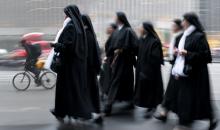
Two months ago, I went to the Maryknoll motherhouse, a massive stone building in Ossining, N.Y., to interview 93-year-old Sister Madeleine Dorsey for a book I am writing. This was a sister who had chosen to stay with the poor in El Salvador after the 1980 murder of Archbishop Oscar Romero. A few months later, she found the bodies of her murdered sisters buried in a shallow grave.
She was willing to risk her life, she said, "to help the poor rise up and know themselves as children of God."
So when I heard that the Vatican had ordered a crackdown on the largest umbrella group of U.S. sisters, accusing them of spending too much time "promoting issues of social justice," I was stunned. Perhaps I shouldn't have been, given Rome's historic failure to support its best and brightest.
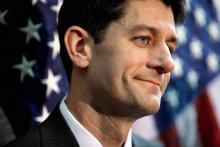
Rep. Paul Ryan is slated to speak at Georgetown University on Thursday morning. In the lead up, a group of professors and administrators is joining the chorus taking Ryan to task for claiming his budget proposal falls in line with Catholic teaching.
“Our problem with Representative Ryan is that he claims his budget is based on Catholic social teaching,” said Jesuit Father Thomas J. Reese, one of the organizers of the letter. “This is nonsense. As scholars, we want to join the Catholic bishops in pointing out that his budget has a devastating impact on programs for the poor.”
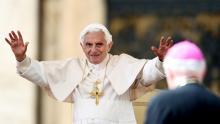
As Pope Benedict XVI marked his seventh anniversary as pope on Thursday (April 19), many Catholics were wondering if the pontiff is finally becoming the papal enforcer that some feared – and others hoped – he would be when he was elected to lead the church in 2005.
The questions were prompted by this week’s announcement that Benedict had signed off on a crackdown on the organization representing most of the 57,000 nuns in the United States, saying that the group was not speaking out strongly enough against gay marriage, abortion and women’s ordination.
But does this latest move indicate that the man once known as the Grand Inquisitor is returning to form, or that a new wave of dissent is emerging?
In response to Rep. Paul Ryan’s recent comments justifying the Republican budget plan on Catholic grounds, 60 prominent Catholic leaders today released a statement saying his claims “profoundly distort” Catholic teaching.
“Simply put, this budget is morally indefensible and betrays Catholic principles of solidarity, just taxation and a commitment to the common good,” the statement reads. “A budget that turns its back on the hungry, the elderly and the sick while giving more tax breaks to the wealthiest few can’t be justified in Christian terms.”
John Gehring, Catholic Outreach Coordinator at Faith in Public Life, believes Ryan’s beliefs are skewed.
“This budget turns centuries of Catholic social teaching on its head,” Gehring said in a news release. “These Catholic leaders and many Catholics in the pews are tired of faith being misused to bless an immoral agenda.”
Read the full statement and signatories HERE.
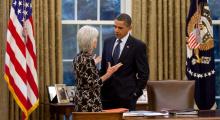
The Obama administration is offering to expand the number of faith-based groups that can be exempt from the controversial contraception mandate, and proposing that third-party companies administer coverage for self-insured faith-based groups at no cost.
At its heart, the newest offering from the White House would allow religious groups -- dioceses, denominations and others -- to decide which affiliated institutions are "religious" and therefore exempt from the new requirement that employers offer free contraception coverage as part of employee insurance plans.
The proposals are an effort by the administration to blunt criticisms of the controversial regulation, especially by the nation's Catholic bishops, who have been at loggerheads with the White House since President Obama announced the contraception mandate in January.

WASHINGTON--A vocal contingent of Republican presidential candidates and church leaders are railing against the Obama administration's ``war on religion,'' but most Americans can't seem to find the fight.
A majority (56 percent) of Americans say religious liberty is not threatened in the U.S., according to a new poll released Thursday (March 15) by the Public Religion Research Institute, which conducted the survey in partnership with Religion News Service.
The poll, which asked a wide range of questions, also found significant support for same-sex marriage.
Even though Catholic bishops are leading the charge that the new White House mandate requiring insurance plans to cover birth control for employees is a threat to religious liberty, Catholics reject -- by a 57 to 38 percent margin -- the idea that religious liberty is under siege.
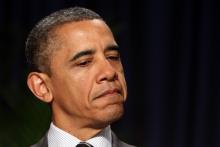
The White House has surprised observers and disappointed some liberal allies by signaling that it is willing to compromise and provide a broader religious exemption in its controversial regulations requiring all employers to provide free contraception coverage.
Given that birth control use is almost universal — even among Catholics — many wonder why the Obama administration could wind up retreating on its pledge.
Here are five reasons that may help explain the political dynamic the president is facing:
1. It's about religious freedom, not birth control
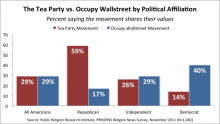
A new poll released this morning by Public Religion Research Institute shows the American public has clear ideas about what steps political leaders should take to reduce the federal deficit.
The poll shows that a majority of white evangelicals are opposed to cutting federal anti-poverty programs for the poor and nearly three-quarters of white evangelicals oppose cutting funding for religious organizations that help the poor.
The poll, based on a survey of 1,002 American adults performed November 10 -14, also shows a nation divided both by political affiliation and generation when it comes to attitudes towards Occupy Wall Street and the Tea Party.
The survey found that nearly 7-in-10 (68 percent) of Americans say that in order to reduce the deficit, it’s fair to ask wealthier Americans to pay a greater percentage in taxes than the middle class or those less well off.

Is Halloween a prime time for evangelism?
Are religious tracks passed out along with (or in lieu of) "treats" really the best way to spread the gospel message?
Or do the roots and practices of Halloween run so deeply counter to Christian tradition that Halloween is best ignored by believers?
At times such as these, the church often finds itself wrestling with the big question H. Richard Niebuhr posed in his seminal 1951 work, Christ and Culture. That is, to what extent should Christians engage in and interact with the world around them?
More than 150 Roman Catholic priests in the United States have signed a statement in support of a fellow cleric Roy Bourgeois, who faces dismissal for participating in a ceremony ordaining a woman as a Catholic priest, in defiance of church teaching.
More than 300 priests and deacons in Austria -- representing 15 percent of Catholic clerics in that country -- last month issued a "Call to Disobedience," which stunned their bishops with a seven-point pledge that includes actively promoting priesthood for women and married men, and reciting a public prayer for "church reform" in every Mass.